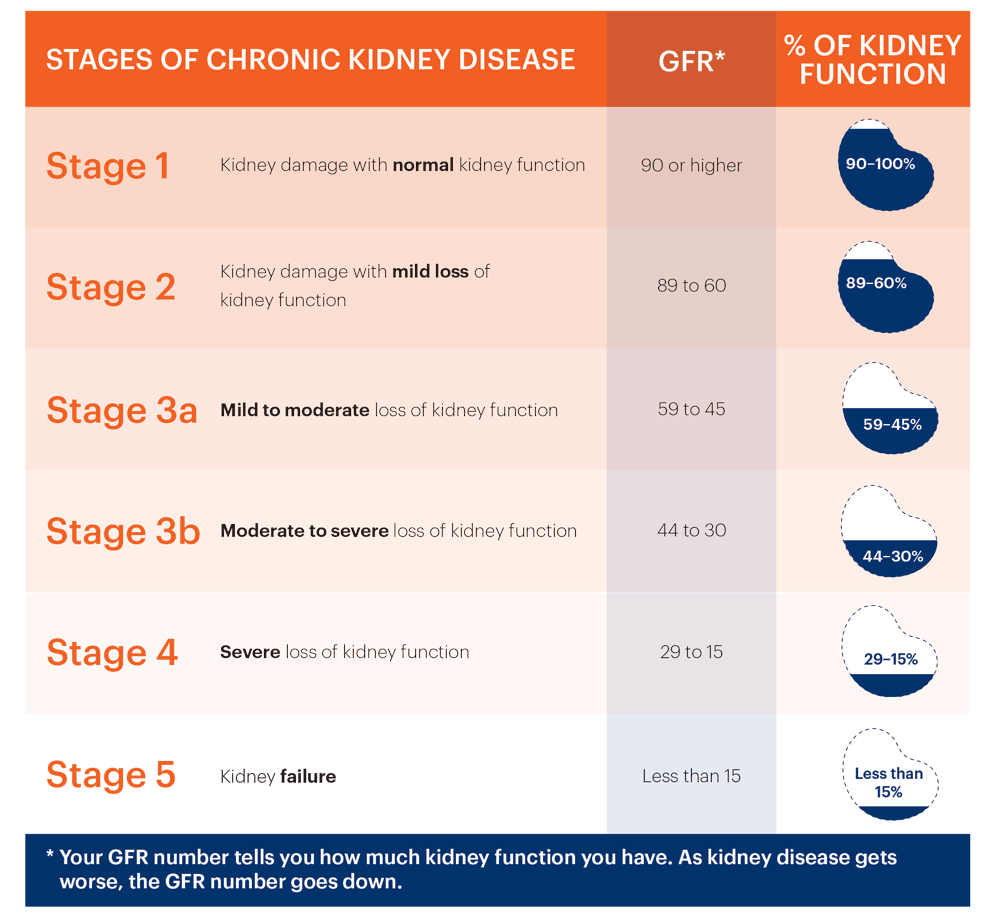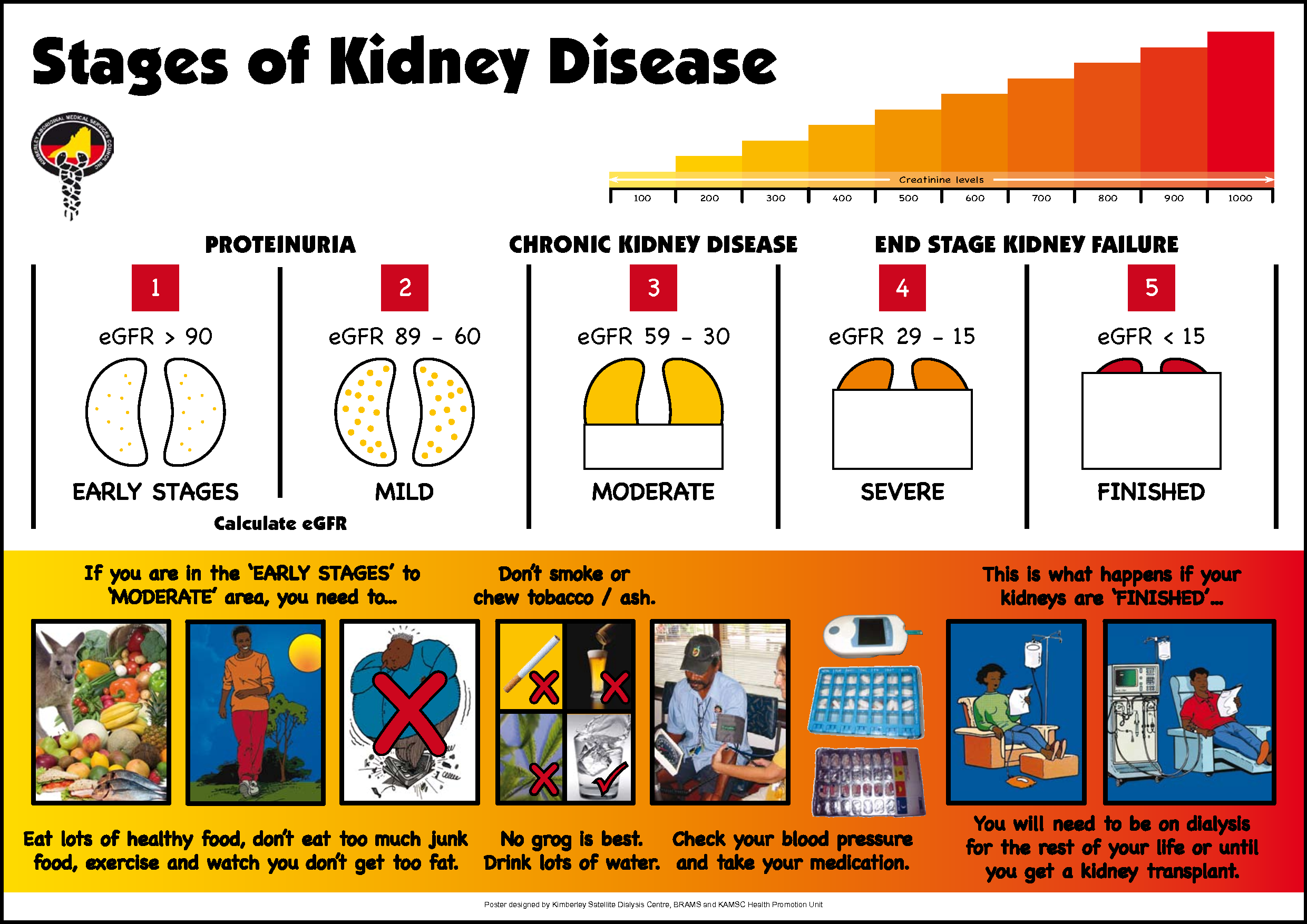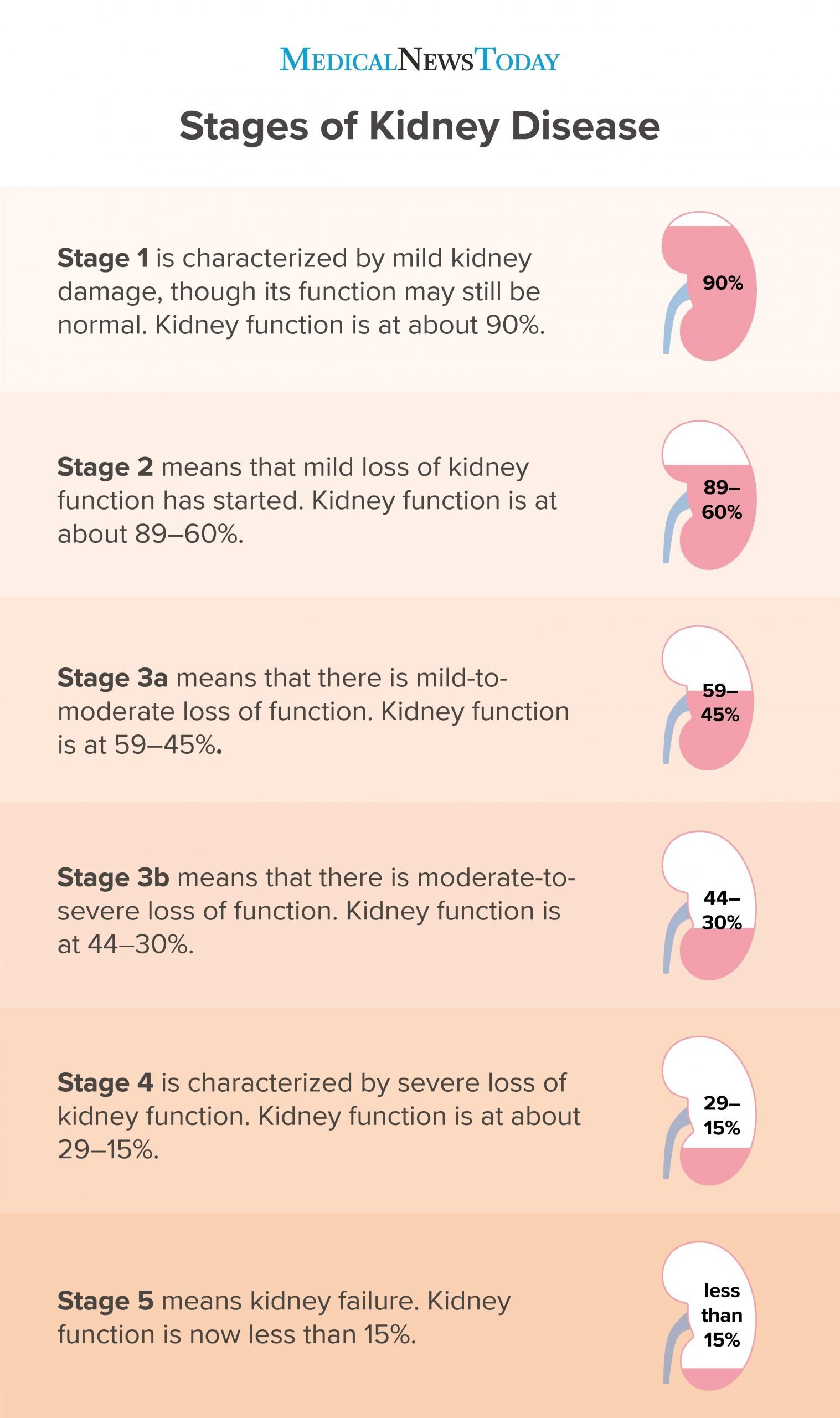What Are The Five Stages Of Kidney Failure
There are five stages of chronic kidney disease , which range from very mild damage in stage 1 to complete kidney failure in stage 5, and are based on how well the kidneys can filter waste and extra fluid out of the blood.;
How well the kidneys filter waste from the body is measured with the estimated glomerular filtration rate , which is a number based on a blood test for creatinine, a waste product in the blood.
Stage 1 chronic kidney disease
- eGFR of 90 or greater
- Mild kidney damage;
- Usually means kidneys are healthy and working well, but there are other signs of kidney damage such as protein in the urine or physical damage the kidneys
Stage 2 chronic kidney disease
- eGFR between 60 and 89
- Mild kidney damage
- Similar to stage 1, stage 2 usually means kidneys are healthy and working well but there are other signs of kidney damage such as protein in the urine or physical damage the kidneys
Stage 3 chronic kidney disease
- eGFR between 30 and 59: stage 3 is separated into two stages
- Stage 3a refers to an eGFR between 45 and 59
- Stage 3b refers to an eGFR between 30 and 44
Stage 4 chronic kidney disease
Stage 5 chronic kidney disease
- eGFR Less than 15
What Causes Kidney Disease
Kidney diseases happen when your kidneys are damaged and cant filter your blood. The damage can happen quickly when its caused by injury or toxins or, more commonly, over months or years.
High blood pressure and diabetes are the two most common causes of chronic kidney disease. Other causes and conditions that affect kidney function and can cause chronic kidney disease include:
- Glomerulonephritis. This type of kidney disease involves damage to the glomeruli, which are the filtering units inside your kidneys.
- Polycystic kidney disease. This is a genetic disorder that causes many fluid-filled cysts to grow in your kidneys, reducing the ability of your kidneys to function.
- Hypertensive nephrosclerosis. Kidney damage caused by chronic, poorly controlled hypertension.
- Membranous nephropathy. This is a disorder where your bodys immune system attacks the waste-filtering membranes in your kidney.
- Obstructions of the urinary tract from kidney stones, an enlarged prostate or cancer.
- Vesicourethral reflux. This is a condition in which urine flows backward refluxes back up the ureters to the kidneys
- Nephrotic syndrome. This is a collection of symptoms that indicate kidney damage.
Can You Change Treatments For Kidney Failure
If you start on one type of treatment for kidney failure but feel you would like to try something else, you can speak to your healthcare professional about changing. For most people, it is often possible to change treatments. For example, if you choose hemodialysis, it doesn’t mean you can’t switch to peritoneal dialysis at a later date. Even if you choose to have a kidney transplant, you may need a period of dialysis until you can be transplanted with a new kidney. It is not uncommon for people who have had kidney failure for many years to have had more than one type of treatment in that time.
Read Also: Does Kidney Disease Make You Tired
How Did It Begin
This all began when Fionas grandma was diagnosed with stage-4 renal disease. They looked for an alternative rather than having her go through dialysis. ;After studying several peer-reviewed journals and other medical literature, they jumped to medical trials. Fionas grandma went through this organic program. In just 12 weeks, her condition improved significantly.
Within six months during her treatment, she transferred from stage-4 to stage-1. Fionas grandma lived on for ten more years before dying of heart failure in 2017.
The Kidney Disease Solution has treated more than 25,000 people globally since 2008.
Five Stages Of Kidney Disease And How To Treat Them

Diabetes nephropathy is glomerular sclerosis and fibrosis brought on by the metabolic and hemodynamic modifications of diabetes.
Many other courses of diabetes drugs that may have been demonstrated to get a constructive impact on the advancement of diabetes nephropathy are GLP-1 agonists and DPP-4 inhibitors. This does not imply screening for diabetic person nephropathy is restricted to the people.
Long-term attempts to manipulate blood pressure levels and diabetes mellitus might be the most effective solution to avoid prolonged renal disease and its progression to end-stage renal failure. Although high hypertension happens when the pressure required to relocate the bloodstream is just too significant, hypotension or low blood pressure levels should there be insufficient power to go blood flow. Reduced hypertension could cause not enough circulation of blood to essential internal organs, like the renal system, triggering the reoccurring renal disorder.
In peritoneal dialysis, the different liquid is positioned to the stomach cavity and then exhausted, with this particular approach recurring several times each day. Critical kidney disorder can lead to whole end-stage renal disease and also the need for dialysis remedies or possibly a renal transplant to be living.
A renal transplant requires operatively putting a healthy kidney coming from a donor in your total body. You never have to be on dialysis to experience a renal transplant.
Read Also: Is Chronic Kidney Disease The Same As Renal Insufficiency
Are There Stages Of Chronic Kidney Disease
Yes, there are five stages of kidney disease. The stages are based on how well your kidneys are able to do their job to filter out waste and extra fluid from your blood. The stages range from very mild to kidney failure . Healthcare providers determine the stage of your kidney function according to the glomerular filtration rate . Your GFR is a number based on the amount of creatinine, a waste product, found in your blood, along with other factors including your age, race and gender.
| Stages of Chronic Kidney Disease |
|---|
| Stage |
- Are African-American, Hispanic, Native American or Asian.
- Are over 60 years of age.
- Have a long history of taking painkillers, including over-the-counter products such as aspirin and ibuprofen.
Learn About Kidney Failure
Even if you get treatment in stage 4 and are careful about your health, your kidneys may still fail. Kidney failure happens when:
- 85-90% of kidney function is gone
- GFR falls below 15
- Kidneys don’t work well enough to keep you alive
There is no cure for kidney failure, but with treatment it is possible to live a long, fulfilling life. Having kidney failure is not a death sentence. People with kidney failure live active lives and continue to do the things they love.
Recommended Reading: Can You Have 4 Kidneys
How Is Kidney Disease Diagnosed
First your healthcare provider will take your medical history, conduct a physical exam, ask about any medication you are currently taking, ask about any symptoms you have noticed, and inquire if any of your family members have kidney disease.
Your healthcare provider will order blood tests, a urine test and will also check your blood pressure.
The blood tests will check:
- Your glomerulofiltration rate . This describes how efficiently your kidneys are filtering blood how many milliliters per minute your kidneys are filtering. Your GFR is used to determine the stage of your kidney disease.
- Your serum creatinine level, which tells how well your kidneys are removing this waste product. Creatinine is a waste product from muscle metabolism and is normally excreted in your urine. A high creatinine level in your blood means that your kidneys are not functioning well enough to get rid it in your urine.
A urine protein test will look for the presence of protein and blood in your urine. Well-functioning kidneys should not have blood or proteins in your urine. If you do, this means your kidneys are damaged.
Stages Of Kidney Disease
Kidney disease or kidney failure is among the most serious kidney problems. You may be suffering from chronic kidney disease in which your kidneys won’t fail all at once. Instead, the disease progresses slowly over the course of several years. Therefore, it is possible to improve your life expectancy if CKD is diagnosed early. You can take certain medications and make some lifestyle changes to slow its progress. For early diagnosis, it is important that you have some knowledge about stages of kidney disease and different symptoms you experience in each stage. Keep reading to learn more.
You May Like: What’s The Difference Between A Uti And A Kidney Infection
Chronic Kidney Disease : A Disease
Chronic kidney diseaseEverglades University Gia DavisDr. Cesar Irrazy AbstractChromic Kidney Disease is a disease that affects 80 percent of the United States population. Though it may seem to come suddenly, it can be prevented and treated by monitoring what you put into the body and how the body functions. Also, knowing the different stages of the disease can help you recognize what is happening to the body and how to help it to recover.Many people are diagnosed
What Are The Stages Of Ckd
Your childs stage of CKD is primarily determined by her;glomerular filtration rate; a measurement of how effectively their kidneys are filtering blood. According to the National Kidney Foundation, there are five stages of chronic kidney disease:
- Stage 1: Kidney damage with normal or increased GFR
- Stage 2: Kidney damage with mild decreased GFR
- Stage 3: Moderate decreased GFR
- Stage 4: Severe increased GFR
- Stage 5: Kidney failure
Keep in mind that this chart is a guide, and every child may experience symptoms differently. Since chronic kidney disease is progressive, many who have it will eventually reach Stage 5, but there are things we can do to slow the progression and minimize complications.
You May Like: What Will Dissolve Calcium Kidney Stones
Early Stage Chronic Renal Failure
up to 70% in kidney function symptoms may still not be present . Insert Fatigue etc here in bullet pointsAssociated conditionsCommonly associative conditions of ESCRF were obesity, glomerular disease , heart disease, hypertension, heart failure, cerebrovascular accidents, urinary tract infections, urinary and kidney stones, polycystic kidney disease, anaemia, oedema, delirium, streptococcal infections and, incontinence .Course/prognosisEarly Stage Chronic Renal
What Is Stage 4 Kidney Disease

Chronic kidney disease happens if your kidneys have been damaged. Kidneys can become damaged from a physical injury or a disease like diabetes or high blood pressure. Once your kidneys are damaged, they are not able to filter blood or do their other jobs well enough to keep you healthy. Some of the important jobs kidneys do:
- Filter blood
- Help keep blood pressure under control
- Keep bones healthy
- Help make red blood cells
There are five stages of chronic kidney disease. The mildest are stages 1 and 2. In these early stages of kidney disease, the kidneys are damaged and not working at full strength. At stage 3, about half of kidney function has been lost. This can cause other problems, like high blood pressure or bone problems. Treatment of these problems is very important, and it can even help slow down the loss of kidney function. At stage 4, severe kidney damage has happened. At this stage, it is very important to slow the loss of kidney function by following your treatment plan, and managing other problems like high blood pressure or heart disease. Stage 5 is kidney failure. If kidney failure happens, you will need a kidney transplant or dialysis to live.
Also Check: Is Pineapple Good For Kidney Stones
Can I Have Kidney Disease Even If My Egfr Is Normal
Yes, your eGFR may still be in the normal range even if you have some signs of kidney damage, such as protein in your urine or physical damage to your kidneys.
If you have protein in your urine, your doctor will check you again to make sure it is not caused by something else, like being dehydrated.
Do I Need To Do Anything To Prepare For My Egfr Test
Your doctor may have you fast or avoid certain foods for several hours before the test. They will let you know how to prepare.
You may have a blood creatinine test as part of a regular check-up or if your doctor thinks you might have kidney disease. Your doctor will figure out your eGFR using your creatinine blood test result and your age, sex, weight and race.
Also Check: Can Ultrasound Detect Kidney Disease
Why Do I Need To Weigh Myself When On Hemodialysis
Keeping track of your weight is a good way to know if your body is holding on to too much water. Because your kidneys are not working well, your body may hold on to extra water between dialysis sessions.
Your target weight is what you should weigh after you have finished each dialysis treatment. Your doctor will work with you to figure out your target weight.
If you are on hemodialysis, you should also weigh yourself every morning and contact your doctor if your weight is much higher or lower than normal. Remember, how closely you follow your food and fluid plan and whether you take your medicines correctly will affect your weight too.
Estimated Glomerular Filtration Rate Test
Please note: eGFR is an estimate of how well your kidneys are working. The way eGFR is calculated will be changing. Currently the test considers your age, sex and race, among other things. A task force led by the National Kidney Foundation and the American Society of Nephrology is working on recommendations that may remove Black race as a factor in the eGFR calculation. The task force has been seeking the input of kidney disease experts to come up with the best way to make the eGFR test as accurate as possible. American Kidney Fund advised the task force to remove race from the eGFR so there is no bias in testing kidney function. This would help to make sure that every person will receive health care that is fair and of the highest quality. When the NKF-ASN task force makes its recommendations, AKF will promptly review them and then update our educational materials.
Also Check: What To Eat To Make Kidney Healthy
Feeling Faint Dizzy Or Weak
Why this happens:
Anemia related to kidney failure means that your brain is not getting enough oxygen. This can lead to feeling faint, dizzy, or weak.
What patients said:
I was always tired and dizzy.
It got to the point, like, I used to be at work, and all of the sudden I’d start getting dizzy. So I was thinking maybe it was my blood pressure or else diabetes was going bad. That’s what was on my mind.
How Our Doctors Determine Your Gfr
GFR is a blood test our nephrologists use to measure the amount of creatinine in the blood. Creatinine is a normal waste product from the muscles that is filtered out through the kidneys. The higher the amount of creatinine found in the blood, the lower the amount of creatinine being filtered out by the kidneys, which tells us how well the kidneys are functioning.
Early detection of kidney disease is important to slow the progression of CKD and a nephorologist should be consulted.; While you cannot reverse damage, in stages 1 and 2, it is possible to prevent further damage and maintain kidney function. Changes in lifestyle and diet, along with regular checkups, can help keep the kidneys from further deterioration. Stages 3, 4 or 5 CKD are when your kidney function is moderately to severly reduced. During these stages is most likely when you will experience physical changes.; If you have not been seen by and evaluated by a nephrologist, it is extremely important that you make an appointment with a nephrologist, like the experienced, reputable physicians at Dallas Nephrology Associates.
Glomerular filtration rate is calculated using the creatinine level in the blood, your age, ethnicity and gender.; Creatinine is a normal waste product found in your body that can build up while your kidney function declines.; Therefore, the higher level of creatinine, the lower your kidney function.
Don’t Miss: What Eases Kidney Stone Pain
Upset Stomach Nausea Vomiting
Why this happens:
A severe build-up of wastes in the blood can also cause nausea and vomiting. Loss of appetite can lead to weight loss.
What patients said:
I had a lot of itching, and I was nauseated, throwing up all the time. I couldn’t keep anything down in my stomach.
When I got the nausea, I couldn’t eat and I had a hard time taking my blood pressure pills.
What Is Kidney Dialysis

Because there is no cure for CKD, if you are in late-stage disease, you and your healthcare team must consider additional options. Complete kidney failure, left untreated, will result in death. Options for end stages of CKD include dialysis and kidney transplantation.
Dialysis is a procedure that uses machines to remove waste products from your body when your kidneys are no longer able to perform this function. There are two major types of dialysis.
Hemodialysis: With hemodialysis, your blood is circulated through a machine that removes waste products, excess water and excess salt. The blood is then returned to your body. Hemodialysis requires three to four hours, three times a week and is performed at a clinic, hospital or dialysis center.
Peritoneal dialysis: In peritoneal dialysis, a dialysis solution is run directly into your abdomen. The solution absorbs waste and then is removed via catheter. Fresh solution is added to continue the process of cleaning. You can perform this type of dialysis yourself. There are two types of peritoneal dialysis: continuous ambulatory peritoneal dialysis , which involves a change in dialysis solution four times a day; and continuous cycling peritoneal dialysis . CCPD uses a machine to automatically fill, remove wastes, and refill the fluid during the nighttime.
Don’t Miss: What Side Is Your Kidneys On